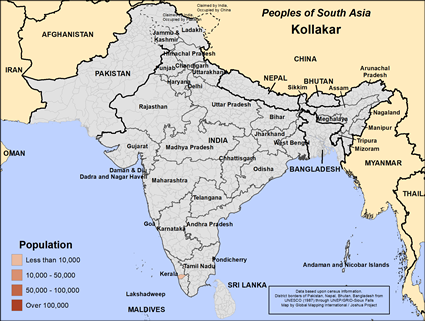Kollakar are a small tribal group that lives in southern India. Since they are an indigenous people, they are outside of the traditional Hindu caste system. They face discrimination by others in Indian society. At one time, the Kollakar were nomadic hunter-gatherers. Today they live in villages near shores of the Arabian Sea.
The primary language of the Kollakar is Malayalam. Many Christian resources are available in Malayalam including a whole Bible and the JESUS Film. The gospel will need to be presented to the Kollakar in visual and oral form.
The Hindu Kollakar people live in one small area inside of southern Indian state of Kerala.
Like many small tribal peoples in India, the Kollakar live in poverty. Illiteracy is wide spread in the Kollakar community. Many Kollakar children leave school to help their parents make a living. Some of the men fish in the Arabian Sea. Women sell the fish and fishing nets made by the men. Many Kollakar work in agriculture as landless laborers. Some men work on boats as unskilled laborers. Some pull rickshaws. If the weather or fishing is bad, the Kollakar can face starvation. Life expectancy is low among the Kollakar due to their lack of access to modern medicine and clean water. Most live in villages without electricity and indoors plumbing.
The Kollakar marry within their group with families arranging the marriages. Village elders settle legal disputes and deal with outsiders.
The main foods of the Kollakar are fish, rice, vegetables, and lentils. As Hindus, they will not eat beef. Meat is often reserved for special occasions.
The Kollakar practice Hinduism influences by folk religion. They pay special reverence to Kali, the goddess of death and sex. During the British period, there were reports that the Portuguese had converted some Kollakar to Roman Catholicism, but today all Kollakar view themselves as Hindus. They worship and serve the gods of the Hindu pantheon.
Hindus believe that by performing rituals and good works that they will attain moksha or freedom from the endless cycle of birth, death and rebirth. The Kollakar visit Hindu shrines and offer prayers, food, flowers, and incense to their gods in hopes of gaining protection and benefits. They do not have a personal or familial relationship with their gods like Christians or Jews.
As a poor tribal Hindu community, the Kollakar have many physical and spiritual needs. They would greatly benefit with access to modern medicine and clean water. They need help in educating their children if they are to escape the cycle of poverty. Most of all, the Kollakar need to hear and understand the message of Jesus Christ who alone can get them right with the one, true God.
Pray for workers to go to the Kollakar people, and for their hearts to be ready to receive their Savior.
Pray for networks of believing Kollakar families and fellowships that will throw the doors open for others to follow Jesus.
Pray for the Lord to bless the families among the Kollakar people with his presence and mercy.
Pray for believers among this people group to disciple others who will disciple still others.
Pray for Bible believing fellowships and churches among the Kollakar people.
Scripture Prayers for the Kollakar in India.
https://en.wikisource.org/wiki/Castes_and_Tribes_of_Southern_India/Kollakar
| Profile Source: Keith Carey |











